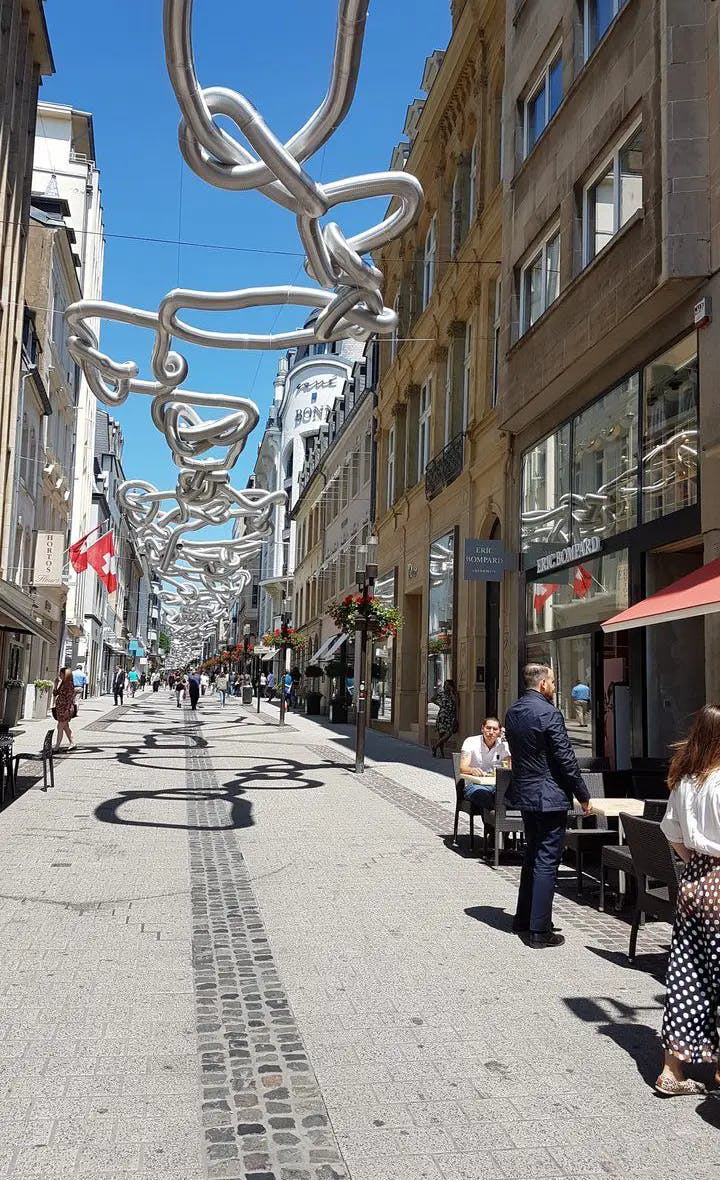The Psychology of Immigration: Crises Expats Face in Luxembourg

An interview with a psychologist about the psychological challenges of moving to Luxembourg: adaptation, identity, career, relationships, and trailing spouses.

In general, I based my research on this topic — moving and its difficulties. But I focused on spouses moving after their partners. The final version of my academic work is: "Perceived well-being and adjustment of expatriate spouses in a multicultural environment".
Who are the trailing spouses
I also chose this topic because no one else is studying it and because it is very interesting. I was in that category myself, so it was worthwhile to have a look at the subject if only to have a better understanding of the processes that happen to me.
Trailing spouses — are spouses (wives or husbands) who follow their partner. This is a huge sacrifice and change for the person, especially if they had a job and a career.
When a person's environment changes radically, his or her identity begins to change too. First, the person seeks an understanding of his environment, then a redefinition of himself within it. He once had answers to the question "Who am I?" when he was living in the country where he was born and where he grew up, and he has been shaping these answers all his life.

It is actually easier for those who come for work purposes. They have a supporting daily system: schedules, routines, and social contacts at work, they know why they came, they have a purpose, an interesting activity they did before and still do. And above all, they don't have to think of anything to do. They don't have to stay at home alone all day! Unlike their spouses.
How important is a country's perception
It is extremely important. We are now going to talk about expectations and how these match up with what happens. Let's take two examples:
- There's a person who, for example, has a brother who lives in Luxembourg
This person has visited the country several times and has seen how things work here. In addition, there is a close relative who may have some tips or secrets. This person will already have a good idea of what it is like to live in Luxembourg. His or her expectations will be as close to the reality as possible. By moving here, he already knows what he is getting into. He will find it much easier to adjust.
- The other person has no idea about Luxembourg or has information from some online sources that may be unreliable or out of date
They may have exaggerated expectations. The Grand Duchy is often presented as a kind of heaven on earth. Once there, many frustrations, disappointments and difficulties awaits.
Of course, a person's personality plays a big role. There are people who make no plans at all when they move. Or they have low expectations. Or, if they're shocked by not having expected as much, they can handle that.
When I moved, I knew nothing about Luxembourg. There was little information, but now there is more, in different languages. Of course, I understood that it was great, but it is not as it is sometimes described: there are disadvantages everywhere, even in the most beautiful country. So it was a little easier for me because I knew what I was going to get.
And of course, it's much easier to adapt when you come to a country and you like it, you fall in love with it. If you arrive and you think, "There's nothing to do here". Well, then there is really going nothing to do.
In general, the desire to get to know the country makes a very big difference. In this respect, people who moved just before the Covid were very unlucky. It was almost impossible to make any kind of social connections because they had introduced strict closures in Europe. Some places were so restricted that people weren't even allowed to go walking.

Luxembourg was lucky — there was no such ban and people spent time exploring the country. I know many examples of people travelling through the woods, going to see other cities, and going hiking. That helps a lot in terms of adaptation.
What about your career
Career is another important issue that has an impact on psycho-emotional well-being. As I said, it's easy for those who come for work.

It is difficult to find work for those who follow their husbands and wives.
Especially if they are not from the EU. They then have to go through the same procedure as their spouse to get authorised to work. And that can be a very time-consuming process.
Of course, if you are an IT or other high-demand professional, the situation is easier, but there are professions where "getting a job" sounds like an unrealistic plan. Getting a teaching job, for example, is extremely difficult here.
As a result, many people find that their careers are falling apart. The question is, will you try to save it?
I have the case of one of my research participants who worked as a lawyer, then moved to Luxembourg, learnt French, retrained as a lawyer and is now working. She has even opened her own law firm.
You can do a career change completely. I know cases like that. The people who have done it are absolutely happy, which is amazing.
Of course, there have been cases where people have had a change of career, it was not very satisfying. But it was a job that brought in money and at least helped with the basic question of survival.
And of course, there are people who choose not to work, who choose to be a mom or a housewife.
It is worth mentioning that men have a much harder time with career problems than women. It is much more painful for their self-identity if they cannot work.
Self-identity and self-esteem are not the same. The former is the answer to the question "Who am I?", and the latter the answer to the question "What am I like?" Self-identifying is much more important than self-esteeming.
For all expats, the issue of self-identity is acute. But it is excruciating for those who have followed someone else. They must rebuild from the start.
How to deal with relationships
When you move, relationships are in crisis. If both spouses have been working, it is particularly acute. Now, one of them becomes completely dependent on the other, financially and documentary, because the country of residence is linked to the marriage.
This can have an impact on the dynamics of the relationship. There can be a lot of misunderstandings because the adjustment process is different for everyone. At the same time, even though the pace of adjustment may vary, it is still a very intense process. A person receives a lot of new information. Many things do not work the way they used to. Sometimes there is almost no time for listening and conversation with a partner.
There are two possible paths:
- The crisis and the process of adjustment bring the couple closer together
A lot of work has been done on both sides. The people in the relationship begin to understand each other better.
- The crisis and the process of adjustment lead the couple to divorce
There are a lot of other examples like this as well. It often happens that the environment brings to light a lot of problems and misunderstandings that had not made themselves known before. Then the couple separates and one of them moves back home or to another country.
There are no exact statistics on this parameter, but there is an interesting observation. Every year, the number of divorces in Luxembourg exceeds the number of marriages. This happens precisely because people come to the Grand Duchy already married and get divorced.
Who to build social connections with
Creating social connections is basically always a very important issue. But here we see an interesting pattern: expats tend to hang out with other expats. It does not necessarily have to be people from the same country. The main thing is that they come from somewhere, just like you.
It is a difficult task to find a Luxembourger and to make friends with him or her. Usually, people born and raised in the country already have a social circle. Why would they want to expand it to include foreigners, who often do not speak the same language as them?
This kind of social interaction among expats is a source of problems.
First of all, it prevents them from integrating. They are completely cut off from the local culture. They don't try to integrate. Or they do, but their efforts are not successful.
Second, expats risk having their new friends leave. This happens quite often. And it is very painful. For example, you come to a new country, you break off almost all of your contacts with the old place, you start making new ones, and everything seems to be fine, but at some point, that's it. A new friend says, "Sorry, I'm leaving, I got a promotion / another job / I'm tired of Luxembourg".
Now you have to make new contacts, rebuild social connections. It's hard, long, and it creates additional frustration and stress that you have to deal with.
But there's a big plus here, too. Other expats know what you're going through and how you feel. They can support you, listen to you or give you advice. That's also very important.
Another very important key, which is one of the key aspects in Luxembourg, is the language.
How important is the language of your new country
If you move to a country and you only speak your native language and it's not English, you're going to have a very difficult time. Just in terms of social interaction.
You won't have the opportunity that we were talking about — to broaden your horizons. Because Luxembourg is really a very unique place to live. No other country in the world has so many foreigners. It is very important to know at least English if you want to build relationships.
For integration into the culture, English is not so useful, although it can be helpful. Here, of course, it is better to speak one of the languages of the country. French is a good starting point. Ideally, you should learn Luxembourgish as well. Although it is the official language, German is not very popular.
Language learning becomes an adaptation technique. It becomes a kind of ritual. It also helps to structure the time and not to fall into depression. As one of the participants in my study said: "INL is a church for expats who go there every week to learn the language”.
Going there is also useful because you're not left alone. You often work in pairs, threes, and fours, and you get to know people, so you can form a social circle.
How to deal with crises
The crises that follow the moving process are unavoidable. But there are ways to do battle. Sometimes you can do it alone, but sometimes it is better to ask for help.
The most important thing is to tell yourself: adapting is difficult, moving is difficult, and it will take some time to get back to normal.
And that's the most important thing. People can start to feel guilty or think they're something they're not. It's not common to admit, to say you're having a hard time or you're depressed.
There's no need to rush. Take your time. Look around, understand where you are, what kind of place this is. No one is asking you to make a hundred friends right away, get a new job, and so on.
The second thing is to learn languages. Even if you don't succeed in learning it, it's a form of activity, a workout for the brain, and an opportunity to make new friends.
Then you should decide on a job. Find out if you want the job or not. If you want it, figure out where to do it and with whom and what steps you need to take. Now is the time to find out where to move. Stay in the same, grow in it, or start looking to specialize. It's great to have a partner to rely on.
Set a goal for yourself. It doesn't have to be a job, it doesn't have to be language study. It can be a charity, it can be some kind of club that you will join, or it can be something you create on your own. The important thing is to find something that you like. This will allow you to get started and start making new connections.
Support your partner. During times of uncertainty and adjustment, emotional support is very important. It is wonderful to be able to express what you're feeling and to receive comfort. You should not feel pressured or blamed. On the contrary, you need to develop empathy and emotional closeness. Then everything will be fine.
Read about the move to Luxembourg and the adaptation in the country in our relocation guide and Knowledge Library:
Share your stories with us. If you would like to tell us about moving to Luxembourg and about life here, please write to our editors via Telegram or email editorial@luxtoday.lu. One person's experience can help many.